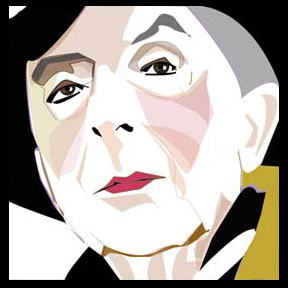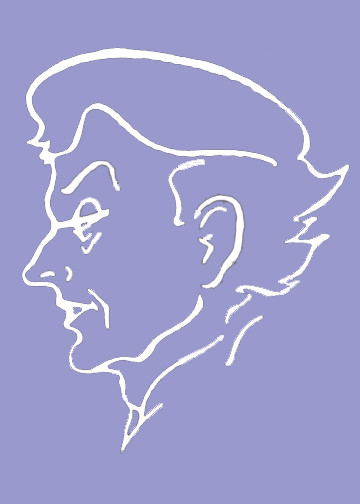|
A CENTENNIAL CELEBRATION! |
|
 |
THE QUENTIN CRISP ARCHIVES
ELAINE GOYCOOLEA
Quentin's niece
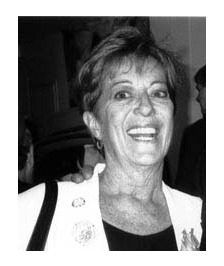 Every time I enter my home in Chile, I am greeted with open arms by Quentin. A photograph by Phillip Ward hangs on the wall. It constantly delights and nourishes me. Every time I enter my home in Chile, I am greeted with open arms by Quentin. A photograph by Phillip Ward hangs on the wall. It constantly delights and nourishes me. I am one of Quentin Crisp’s three nieces: Frances Ramsay, our English born cousin; Denise Pratt, my sister; and myself, Elaine. Denise, who was named after Quentin (neé Denis) and I, were both born in Brazil because my father, Quentin’s older brother, went to South America when he was twenty-three and remained there the rest of his life. I first met Quentin when I turned eighteen, but got to know him well later when my husband and I lived in England when we first got married. We spent most of our weekends at my Auntie Phil’s home. She was Quentin’s sister and was married to the Reverend John Payne. Quentin was usually there too. Of those weekend visits he wrote in one of his letters, and I quote, “I shall go and stay with Phil which is always marvelously peaceful and then go back to London School of Printing. They don’t really need models but I have become a sort of status symbol….a naked Cadillac….” The family loved to play all sorts of games such as canasta, scrabble or do the crossword or jigsaw puzzles. My grandmother once said of me “Isn’t there a game this poor child can play and win?” I never measured up on that front. Quentin was so good at games. One time he waltzed in just off the train and my aunt was doing the crossword puzzle. She said something like, “Denis, what’s a five letter word for 'something or other'? And he quickly gave it to her, prompting her to say, “Oh, did you do the crossword today?” “Yes,” he replied, “I did it on the train coming down.” “Do you have it with you?” asked Aunty Phil. “No” he said, “I didn’t have a pencil.” Quentin and I often went to the movies together while we were in London. That was something he loved to do. This was before he was famous and his lifestyle and appearance became accepted by everyone. He would visit us at our apartment and sometimes I would hide him from people he didn’t want to see or meet. However, when we had a party he most certainly held court to everybody’s fascination. My husband, who stayed on in England a couple of months after I returned to Chile with my baby daughter Michele, said he had never met a more polite or more considerate person in the world than Quentin. Whenever they went to the movies, Quentin made sure my husband and he were not seen coming out of the movies together in case people got the wrong idea. I visited him often at his apartment, which was quite large compared to the tiny cubicle he lived in when in Manhattan. I did notice though, that his fork was more like a spoon and his kettle quite black. Once many years after he became famous, I asked whether I could stay the night there. He was horrified at the thought and when I said I had not enough money to pay for a hotel room, he replied quite gleefully, “Ohhhhh, I have plenty of that,” and opened a drawer and it was full of money and uncashed cheques. He said, though, in 1975, when he wrote to my sister after his life story was put on the screen, “No way has yet come to hand of converting all this notoriety into wealth.” For many years we worried about his income. He lived so frugally that when he died it came to light he had amassed a nice nest egg, which surprisingly he divided evenly between his three nieces. This always struck me as very telling because underneath the purple hair and extravagant make up he was quite conventional in his standards. He sometimes is portrayed as a flighty and affected witty homosexual but he was a warm and caring uncle to us. My home in Chile is called La Morada, which means both purple and dwelling. It is named after Quentin because he had purple hair. He said in a letter that he had received a present from Frances of purple pillow cases which he said was a great idea as the dye from his hair turned all pillow cases purple by the end of the week. When he finally came to live in the States, seeing him was made so much easier. Both my children were living there and we would meet on Second Avenue at the diner for lunch during my trips in the summer. I never did go into his apartment in Manhattan because I was never asked to and wouldn’t dream of imposing. Quentin loved everything about the United States. I asked him several times to come and stay with us in Chile but he refused saying he didn’t speak Chilean. He said he would try to live in the States forever but said his age might make it impossible to become an immigrant but that he might gradually become a resident alien. I am thrilled and delighted that John Hurt will be in the new movie about Quentin, An Englishman in New York. He is so like both my father and Quentin, it is uncanny. 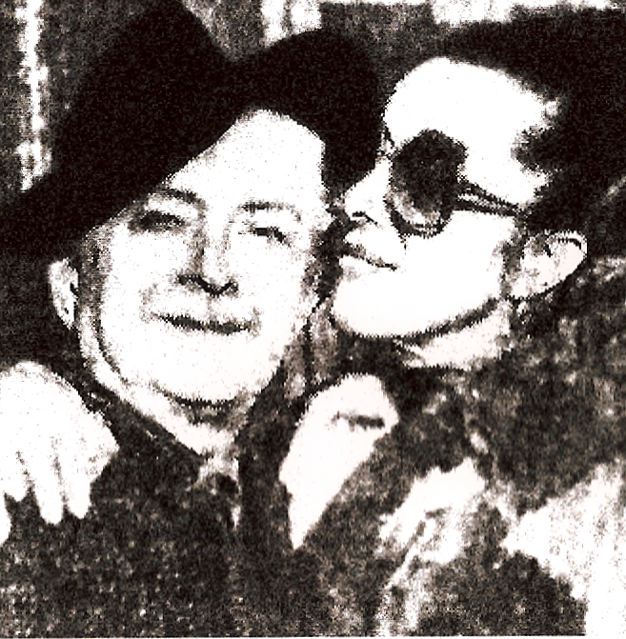 I am proud to be part of the Pratt family. They were all very special, notoriously different and exciting people. I am proud to be part of the Pratt family. They were all very special, notoriously different and exciting people.People were surprised to find out that Quentin not only had a family but had one that loved and deeply cared for him. My son Adrian and daughter Michele made sure he had all the help he needed without encroaching on his privacy which we all knew was so important to him. I think that maybe his image would seem more mundane if it was known that he was part of a perfectly normal family. While his public image was so theatrical and glamorous the one we saw and shared was one of a kind, gentle sweet person who often said that had he been a woman he would have owned a knitting store somewhere and been quite content. |
|
Read what Elaine Goycoolea wrote for the tribute booklet An Evening for Quentin Crisp: The Memorial. < |
"Quentin with Elaine" copyright © by Elaine Goycoolea. All rights reserved. Used by permission.
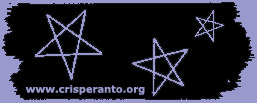
Site Copyright © 1999–2009 by the Quentin Crisp Archives.
All rights reserved.
